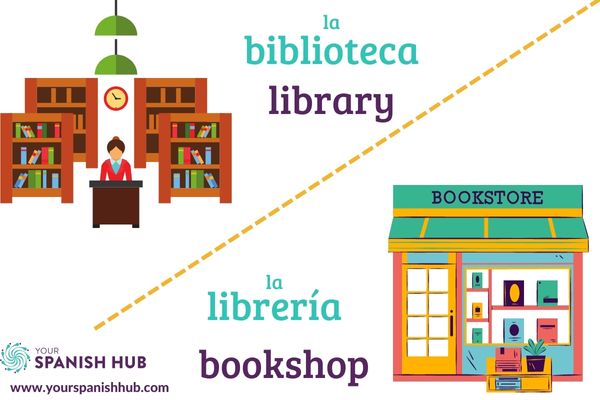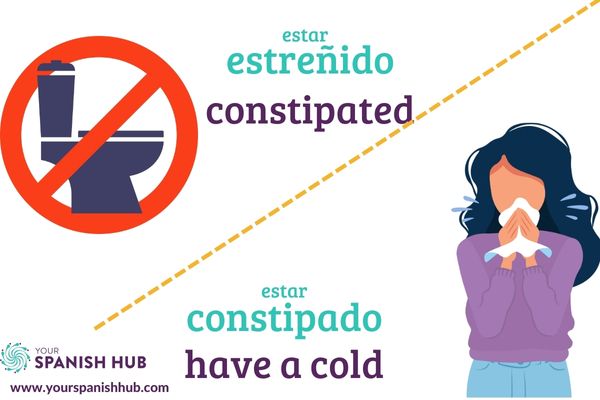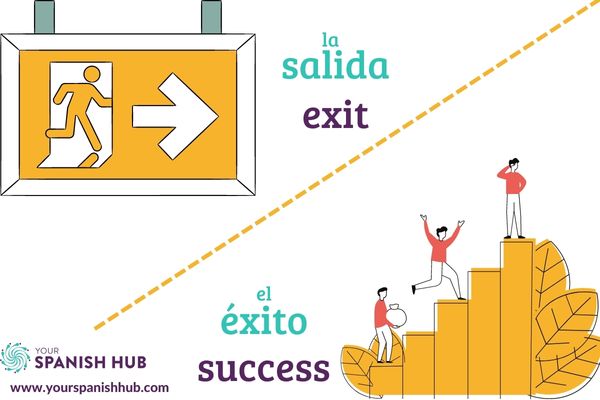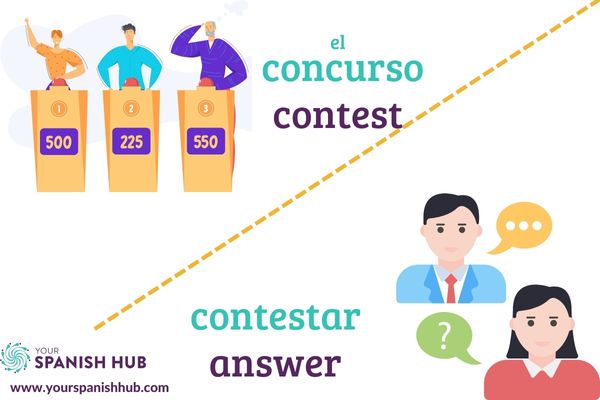As a Spanish tutor, I have seen many of my English-speaking students get confused with these words that are so similar between the two languages: false friends.
Specifically, for one of them (number 5 in this article), it poses a real challenge even for the advanced level students in our individual Spanish classes.
Do you know what my first false friend was when I was learning English? Confident (as an adjective). In Spanish, a confidente (as a name), is a person to whom you trust your secrets. But in English, confident (as an adjective) means to feel assured about something. My English teacher at the time made a joke about it 🙁😢 and my self-confidence dropped a bit… Now, as a Spanish tutor, I try to be careful with this, because false friends are everywhere.
Being a Spanish tutor, I make a lot of false friends lists between English and Spanish, because they are a great help for our English-speaking students. In our Facebook community, on Mondays, we publish posts about false friends and the selection of 9 of these ‘couples’ for this article has been based on the posts that have accumulated the most ‘likes’ 👍 from our followers.

A false friend is a word from another language that closely resembles a word from the speaker’s native language. This resemblance may be in writing or in pronunciation.
This term was used for the first time by the French authors Koessler and Derocquigny in their book Les faux-amis ou les trahisons du vocabulaire anglais (The false friends or the betrayals of the English vocabulary) in 1928.
In my classes I have a student who is passionate about the etymology or origin of words. Many times, after our classes, she sends me emails explaining the origin of expressions or words that we have seen during the lesson (she becomes my Spanish tutor 😊). Well, many false friends have their origin in a common etymology that has derived different meanings in each language.
Here we have the list of the most successful posts of false friends between Spanish and English from our community of followers on Facebook. As a Spanish tutor, I will add some examples of their use in context so that you remember and understand them better.
Library: biblioteca.
Librería: bookstore.
The origin of both words comes from the Latin liber (book, libro).
Embarrassed: avergonzado.
Embarazada: pregnant.
The origin of embarazar comes from the Portuguese word embaraçar, which in turn comes from the word baraça which means ‘tie’ or ‘string’ and which is of pre-Roman or Celtic origin.
The word preñada, which also means embarazada, is more like the English word pregnant. Both come from the Latin praegnas which means ‘to be full’ or “about to sprout”.
Introduce: presentar (a alguien).
Introducir: insert.
The word introducir comes from the Latin introducere, which means ‘to lead in’. In this sense, it is more related to the English meaning of insert, which also comes from the Latin insertare, which means ‘to insert’.

Constipated: estar estreñido.
Constipado: have a cold.
These words come from the Latin constīpo, which is a compound of stīpo which means ‘to squeeze’ or ‘to pile up’ and the suffix cons which means ‘to crowd’, therefore, it reinforces the sense of ‘union’.
The word constīpo was very successful as a technicality in the medical Latin of the time. At that time, it was applied to diagnose ‘the constriction of the ducts through which the humours had to pass.’ Therefore, the meaning evolved to ‘obturar’ or ‘obstruct’. At first, this obstruction was applied to the digestive ducts, hence the meaning of ‘being constipated’, but over time, it was applied to all kinds of ducts, including the respiratory ducts, which are clogged when we have a cold.
Realise: darse cuenta de algo.
Realizar: to make something, to carry out something, to execute something.
This is one of the false friends that causes the most problems for advanced level students.
The word realizar comes from the Latin realis, which means ‘real’, with the Latin suffix -izare, which means ‘to put into practice, to convert into’. Therefore, realizar means ‘to make anything real’. This meaning agrees with the meaning of the verb in Spanish.
Exit: salida.
Éxito: success.
The word éxito comes from the Latin exitus which means ‘exit, end’. Therefore, the English word exit agrees with this meaning. In Spanish, we have gone a little further and we consider it as ‘a result or outcome, what is at the end of an action or project’. In Spanish, the word has a positive connotation: for the result to be successful, it has to be good.

Remove: eliminar o quitar algo.
Remover: stir, mix.
The word remover comes from the Latin removere, which means ‘to move from one side to another’. This meaning agrees with the meaning of the verb in Spanish. In the case of the English remove, the evolution of its meaning has come to ‘extirpate’ or ‘eliminate’.
Fabric: tejido o tela.
Fábrica: factory.
The verb fabricar comes from the Latin fabricare, which means ‘to create, build, manufacture’. Its lexical root is faber, which means ‘craftsman, worker’. Connected with the verb and with the noun, the evolution of these words is understood in Spanish, to indicate the place where the products are manufactured, and in English, to designate one of the final products of these processes.
Contest: concurso o competición.
Contestar: answer, reply.
The verb contestar comes from the Latin contestari, which means ‘to start a judicial debate’, ‘to prove a judicial argument with witnesses’ or ‘to obtain a statement with testimony from multiple parties’. From this contrasting value of witnesses or testimonies (probably opposite), the idea of giving a counter-answer or reply is born.

If you have enjoyed reading this article, you can continue to do so with our Spanish classes and our Spanish tutors at Your Spanish Hub.
Take a look at our catalogue of online Spanish classes and at our Membership Programme, and book your trial class today with one of our accredited native teachers.
The origin and evolution of words, used by different societies in different regions of the world, throughout history, is really interesting and curious. Which proves that languages are dynamic and change and adapt to the times and the uses that people give them, that in the end, we are the ones who use them throughout the world.
